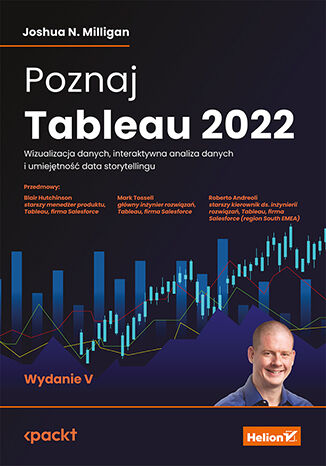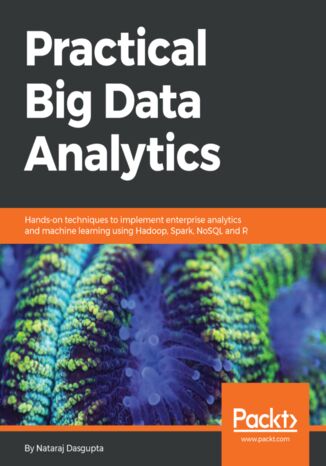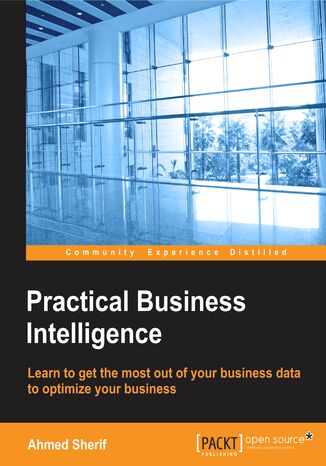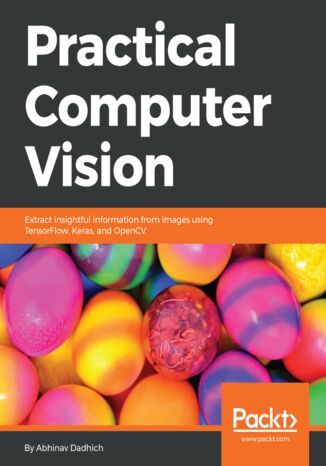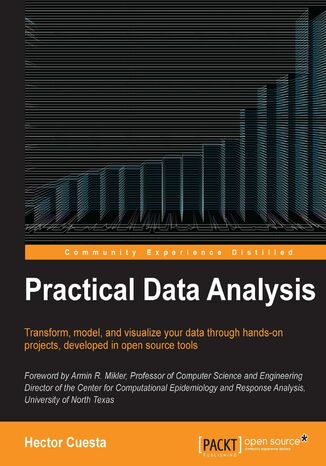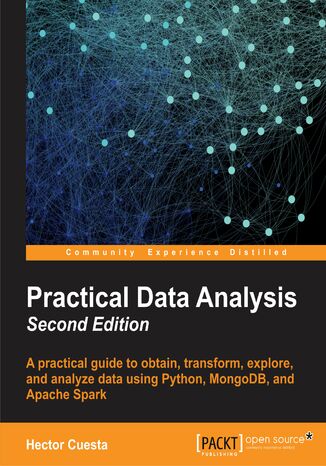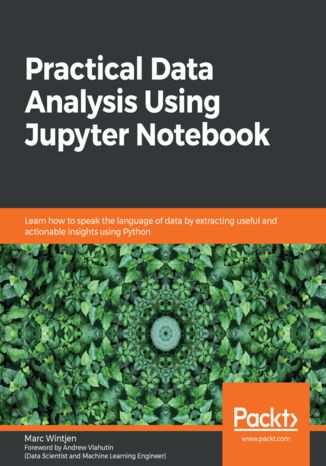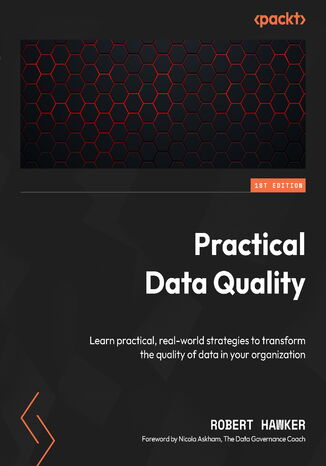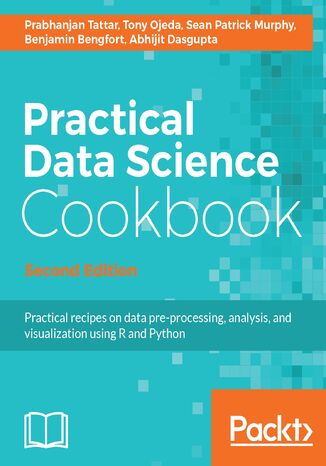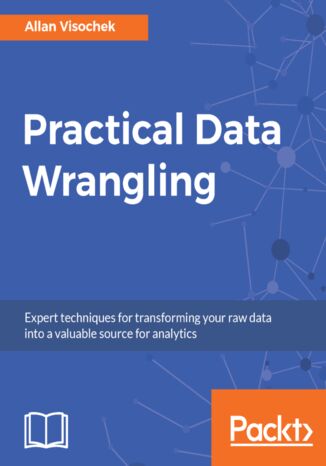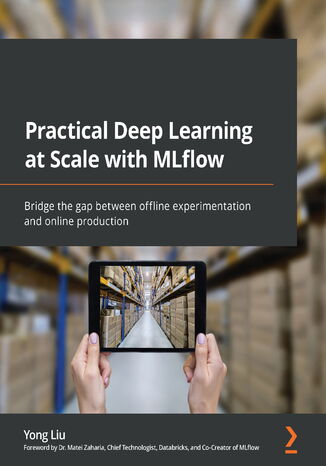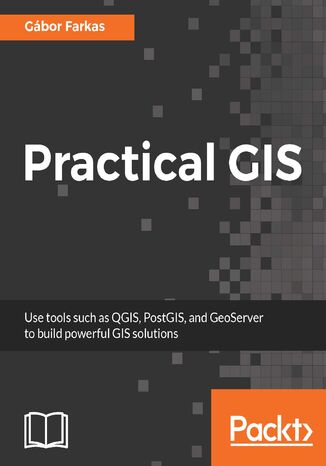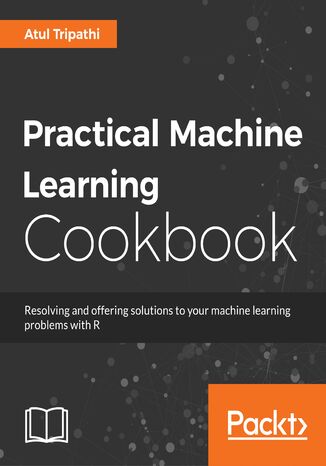Analiza danych
Joshua N. Milligan
Dane stały się paliwem rozwoju cywilizacji. Wykorzystanie ich potencjału jest jednak trudne: problemem okazuje się wyciąganie z nich informacji i wniosków, aby można było na ich podstawie podejmować trafne decyzje. Jednym z narzędzi ułatwiających tę pracę jest Tableau - program do analityki danych, który umożliwia ich zrozumienie, interpretację i prowadzenie na nich efektywnych działań. Dzięki tej książce płynnie rozpoczniesz pracę z Tableau 2022 i nauczysz się wizualizacji danych. Dowiesz się, jak je analizować i przedstawiać w formie graficznej, a także jak opowiadać oparte na nich historie. W tym wydaniu ujęto najnowsze funkcje programu, między innymi rozszerzenia pulpitów nawigacyjnych, Explain Data i integrację z CRM Analytics (Einstein Analytics), służącym do modelowania predyktywnego w Tableau. Pokazano również, jak używać tabel i obliczeń na różnych poziomach szczegółowości i stosować wizualną analitykę statystyczną. Następnie zademonstrowano techniki łączenia różnych źródeł danych z funkcjonalnościami modeli danych Tableau wraz z mapami i wizualizacjami geoprzestrzennymi. Z tego przewodnika dowiesz się też, jak korzystać z funkcji Tableau Prep Builder, by skutecznie oczyścić i zorganizować dane. Dzięki książce nauczysz się: tworzyć zachwycające wizualizacje złożonych danych budować interaktywne pulpity nawigacyjne korzystać z obliczeń w celu rozwiązywania problemów i uzupełniania analiz wzbogacać możliwości Tableau poprzez rozszerzenia, skrypty i CRM Analytics oczyszczać i organizować dane w Tableau tworzyć angażujące historie oparte na danych Przekonaj się, co Tableau wyczaruje z Twoich danych!
Nataraj Dasgupta
Big Data analytics relates to the strategies used by organizations to collect, organize, and analyze large amounts of data to uncover valuable business insights that cannot be analyzed through traditional systems. Crafting an enterprise-scale cost-efficient Big Data and machine learning solution to uncover insights and value from your organization’s data is a challenge. Today, with hundreds of new Big Data systems, machine learning packages, and BI tools, selecting the right combination of technologies is an even greater challenge. This book will help you do that. With the help of this guide, you will be able to bridge the gap between the theoretical world of technology and the practical reality of building corporate Big Data and data science platforms. You will get hands-on exposure to Hadoop and Spark, build machine learning dashboards using R and R Shiny, create web-based apps using NoSQL databases such as MongoDB, and even learn how to write R code for neural networks.By the end of the book, you will have a very clear and concrete understanding of what Big Data analytics means, how it drives revenues for organizations, and how you can develop your own Big Data analytics solution using the different tools and methods articulatedin this book.
Practical Business Intelligence. Optimize Business Intelligence for Efficient Data Analysis
Ahmed Sherif
Business Intelligence (BI) is at the crux of revolutionizing enterprise. Everyone wants to minimize losses and maximize profits. Thanks to Big Data and improved methodologies to analyze data, Data Analysts and Data Scientists are increasingly using data to make informed decisions. Just knowing how to analyze data is not enough, you need to start thinking how to use data as a business asset and then perform the right analysis to build an insightful BI solution. Efficient BI strives to achieve the automation of data for ease of reporting and analysis. Through this book, you will develop the ability to think along the right lines and use more than one tool to perform analysis depending on the needs of your business. We start off by preparing you for data analytics. We then move on to teach you a range of techniques to fetch important information from various databases, which can be used to optimize your business.The book aims to provide a full end-to-end solution for an environment setup that can help you make informed business decisions and deliver efficient and automated BI solutions to any company.It is a complete guide for implementing Business intelligence with the help of the most powerful tools like D3.js, R, Tableau, Qlikview and Python that are available on the market.
Abhinav Dadhich
In this book, you will find several recently proposed methods in various domains of computer vision. You will start by setting up the proper Python environment to work on practical applications. This includes setting up libraries such as OpenCV, TensorFlow, and Keras using Anaconda. Using these libraries, you'll start to understand the concepts of image transformation and filtering. You will find a detailed explanation of feature detectors such as FAST and ORB; you'll use them to find similar-looking objects.With an introduction to convolutional neural nets, you will learn how to build a deep neural net using Keras and how to use it to classify the Fashion-MNIST dataset. With regard to object detection, you will learn the implementation of a simple face detector as well as the workings of complex deep-learning-based object detectors such as Faster R-CNN and SSD using TensorFlow. You'll get started with semantic segmentation using FCN models and track objects with Deep SORT. Not only this, you will also use Visual SLAM techniques such as ORB-SLAM on a standard dataset. By the end of this book, you will have a firm understanding of the different computer vision techniques and how to apply them in your applications.
Hector Cuesta
Plenty of small businesses face big amounts of data but lack the internal skills to support quantitative analysis. Understanding how to harness the power of data analysis using the latest open source technology can lead them to providing better customer service, the visualization of customer needs, or even the ability to obtain fresh insights about the performance of previous products. Practical Data Analysis is a book ideal for home and small business users who want to slice and dice the data they have on hand with minimum hassle.Practical Data Analysis is a hands-on guide to understanding the nature of your data and turn it into insight. It will introduce you to the use of machine learning techniques, social networks analytics, and econometrics to help your clients get insights about the pool of data they have at hand. Performing data preparation and processing over several kinds of data such as text, images, graphs, documents, and time series will also be covered.Practical Data Analysis presents a detailed exploration of the current work in data analysis through self-contained projects. First you will explore the basics of data preparation and transformation through OpenRefine. Then you will get started with exploratory data analysis using the D3js visualization framework. You will also be introduced to some of the machine learning techniques such as, classification, regression, and clusterization through practical projects such as spam classification, predicting gold prices, and finding clusters in your Facebook friends' network. You will learn how to solve problems in text classification, simulation, time series forecast, social media, and MapReduce through detailed projects. Finally you will work with large amounts of Twitter data using MapReduce to perform a sentiment analysis implemented in Python and MongoDB. Practical Data Analysis contains a combination of carefully selected algorithms and data scrubbing that enables you to turn your data into insight.
Practical Data Analysis. Pandas, MongoDB, Apache Spark, and more - Second Edition
Hector Cuesta, Dr. Sampath Kumar
Beyond buzzwords like Big Data or Data Science, there are a great opportunities to innovate in many businesses using data analysis to get data-driven products. Data analysis involves asking many questions about data in order to discover insights and generate value for a product or a service.This book explains the basic data algorithms without the theoretical jargon, and you’ll get hands-on turning data into insights using machine learning techniques. We will perform data-driven innovation processing for several types of data such as text, Images, social network graphs, documents, and time series, showing you how to implement large data processing with MongoDB and Apache Spark.
Marc Wintjen, Andrew Vlahutin
Data literacy is the ability to read, analyze, work with, and argue using data. Data analysis is the process of cleaning and modeling your data to discover useful information. This book combines these two concepts by sharing proven techniques and hands-on examples so that you can learn how to communicate effectively using data.After introducing you to the basics of data analysis using Jupyter Notebook and Python, the book will take you through the fundamentals of data. Packed with practical examples, this guide will teach you how to clean, wrangle, analyze, and visualize data to gain useful insights, and you'll discover how to answer questions using data with easy-to-follow steps.Later chapters teach you about storytelling with data using charts, such as histograms and scatter plots. As you advance, you'll understand how to work with unstructured data using natural language processing (NLP) techniques to perform sentiment analysis. All the knowledge you gain will help you discover key patterns and trends in data using real-world examples. In addition to this, you will learn how to handle data of varying complexity to perform efficient data analysis using modern Python libraries.By the end of this book, you'll have gained the practical skills you need to analyze data with confidence.
Robert Hawker, Nicola Askham
Poor data quality can lead to increased costs, hinder revenue growth, compromise decision-making, and introduce risk into organizations. This leads to employees, customers, and suppliers finding every interaction with the organization frustrating.Practical Data Quality provides a comprehensive view of managing data quality within your organization, covering everything from business cases through to embedding improvements that you make to the organization permanently. Each chapter explains a key element of data quality management, from linking strategy and data together to profiling and designing business rules which reveal bad data. The book outlines a suite of tried-and-tested reports that highlight bad data and allow you to develop a plan to make corrections. Throughout the book, you’ll work with real-world examples and utilize re-usable templates to accelerate your initiatives.By the end of this book, you’ll have gained a clear understanding of every stage of a data quality initiative and be able to drive tangible results for your organization at pace.
Prabhanjan Narayanachar Tattar, Bhushan Purushottam Joshi, Sean...
As increasing amounts of data are generated each year, the need to analyze and create value out of it is more important than ever. Companies that know what to do with their data and how to do it well will have a competitive advantage over companies that don’t. Because of this, there will be an increasing demand for people that possess both the analytical and technical abilities to extract valuable insights from data and create valuable solutions that put those insights to use. Starting with the basics, this book covers how to set up your numerical programming environment, introduces you to the data science pipeline, and guides you through several data projects in a step-by-step format. By sequentially working through the steps in each chapter, you will quickly familiarize yourself with the process and learn how to apply it to a variety of situations with examples using the two most popular programming languages for data analysis—R and Python.
Allan Visochek
Around 80% of time in data analysis is spent on cleaning and preparing data for analysis. This is, however, an important task, and is a prerequisite to the rest of the data analysis workflow, including visualization, analysis and reporting. Python and R are considered a popular choice of tool for data analysis, and have packages that can be best used to manipulate different kinds of data, as per your requirements. This book will show you the different data wrangling techniques, and how you can leverage the power of Python and R packages to implement them.You’ll start by understanding the data wrangling process and get a solid foundation to work with different types of data. You’ll work with different data structures and acquire and parse data from various locations. You’ll also see how to reshape the layout of data and manipulate, summarize, and join data sets. Finally, we conclude with a quick primer on accessing and processing data from databases, conducting data exploration, and storing and retrieving data quickly using databases.The book includes practical examples on each of these points using simple and real-world data sets to give you an easier understanding. By the end of the book, you’ll have a thorough understanding of all the data wrangling concepts and how to implement them in the best possible way.
Yong Liu, Dr. Matei Zaharia
The book starts with an overview of the deep learning (DL) life cycle and the emerging Machine Learning Ops (MLOps) field, providing a clear picture of the four pillars of deep learning: data, model, code, and explainability and the role of MLflow in these areas.From there onward, it guides you step by step in understanding the concept of MLflow experiments and usage patterns, using MLflow as a unified framework to track DL data, code and pipelines, models, parameters, and metrics at scale. You’ll also tackle running DL pipelines in a distributed execution environment with reproducibility and provenance tracking, and tuning DL models through hyperparameter optimization (HPO) with Ray Tune, Optuna, and HyperBand. As you progress, you’ll learn how to build a multi-step DL inference pipeline with preprocessing and postprocessing steps, deploy a DL inference pipeline for production using Ray Serve and AWS SageMaker, and finally create a DL explanation as a service (EaaS) using the popular Shapley Additive Explanations (SHAP) toolbox.By the end of this book, you’ll have built the foundation and gained the hands-on experience you need to develop a DL pipeline solution from initial offline experimentation to final deployment and production, all within a reproducible and open source framework.
Practical GIS. Learn novice to advanced topics such as QGIS, Spatial data analysis, and more
Gábor Farkas
The most commonly used GIS tools automate tasks that were historically done manually—compiling new maps by overlaying one on top of the other or physically cutting maps into pieces representing specific study areas, changing their projection, and getting meaningful results from the various layers by applying mathematical functions and operations. This book is an easy-to-follow guide to use the most matured open source GIS tools for these tasks.We’ll start by setting up the environment for the tools we use in the book. Then you will learn how to work with QGIS in order to generate useful spatial data. You will get to know the basics of queries, data management, and geoprocessing.After that, you will start to practice your knowledge on real-world examples. We will solve various types of geospatial analyses with various methods. We will start with basic GIS problems by imitating the work of an enthusiastic real estate agent, and continue with more advanced, but typical tasks by solving a decision problem. Finally, you will find out how to publish your data (and results) on the web. We will publish our data with QGIS Server and GeoServer, and create a basic web map with the API of the lightweight Leaflet web mapping library.
Practical Machine Learning Cookbook. Supervised and unsupervised machine learning simplified
Atul Tripathi
Machine learning has become the new black. The challenge in today’s world is the explosion of data from existing legacy data and incoming new structured and unstructured data. The complexity of discovering, understanding, performing analysis, and predicting outcomes on the data using machine learning algorithms is a challenge. This cookbook will help solve everyday challenges you face as a data scientist. The application of various data science techniques and on multiple data sets based on real-world challenges you face will help you appreciate a variety of techniques used in various situations.The first half of the book provides recipes on fairly complex machine-learning systems, where you’ll learn to explore new areas of applications of machine learning and improve its efficiency. That includes recipes on classifications, neural networks, unsupervised and supervised learning, deep learning, reinforcement learning, and more.The second half of the book focuses on three different machine learning case studies, all based on real-world data, and offers solutions and solves specific machine-learning issues in each one.
Ralph Winters
This is the go-to book for anyone interested in the steps needed to develop predictive analytics solutions with examples from the world of marketing, healthcare, and retail. We'll get startedwith a brief history of predictive analytics and learn about different roles and functions people play within a predictive analytics project. Then, we will learn about various ways of installing R along with their pros and cons, combined with a step-by-step installation of RStudio,and a description of the best practices for organizing your projects.On completing the installation, we will begin to acquire the skills necessary to input, clean, and prepare your data for modeling. We will learn the six specific steps needed to implement andsuccessfully deploy a predictive model starting from asking the right questions through model development and ending with deploying your predictive model into production. We will learn whycollaboration is important and how agile iterative modeling cycles can increase your chances of developing and deploying the best successful model.We will continue your journey in the cloud by extending your skill set by learning about Databricks and SparkR, which allow you to develop predictive models on vast gigabytes of data.
Shilpi Saxena, Saurabh Gupta
With the rise of Big Data, there is an increasing need to process large amounts of data continuously, with a shorter turnaround time. Real-time data processing involves continuous input, processing and output of data, with the condition that the time required for processing is as short as possible.This book covers the majority of the existing and evolving open source technology stack for real-time processing and analytics. You will get to know about all the real-time solution aspects, from the source to the presentation to persistence. Through this practical book, you’ll be equipped with a clear understanding of how to solve challenges on your own.We’ll cover topics such as how to set up components, basic executions, integrations, advanced use cases, alerts, and monitoring. You’ll be exposed to the popular tools used in real-time processing today such as Apache Spark, Apache Flink, and Storm. Finally, you will put your knowledge to practical use by implementing all of the techniques in the form of a practical, real-world use case.By the end of this book, you will have a solid understanding of all the aspects of real-time data processing and analytics, and will know how to deploy the solutions in production environments in the best possible manner.
Pethuru Raj Chelliah, Shreyash Naithani, Shailender Singh
Site reliability engineering (SRE) is being touted as the most competent paradigm in establishing and ensuring next-generation high-quality software solutions.This book starts by introducing you to the SRE paradigm and covers the need for highly reliable IT platforms and infrastructures. As you make your way through the next set of chapters, you will learn to develop microservices using Spring Boot and make use of RESTful frameworks. You will also learn about GitHub for deployment, containerization, and Docker containers. Practical Site Reliability Engineering teaches you to set up and sustain containerized cloud environments, and also covers architectural and design patterns and reliability implementation techniques such as reactive programming, and languages such as Ballerina and Rust. In the concluding chapters, you will get well-versed with service mesh solutions such as Istio and Linkerd, and understand service resilience test practices, API gateways, and edge/fog computing.By the end of this book, you will have gained experience on working with SRE concepts and be able to deliver highly reliable apps and services.

